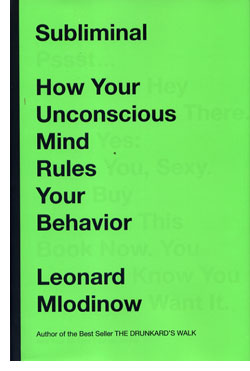 |
 Leonard Mlodinow
Leonard Mlodinow
Subliminal: How Your Unconscious Mind Rules Your Behavior
Pantheon / Random House
US Hardcover First Edition
ISBN 978-0-307-37821-7
Publication Date: 04-24-2012
262 Pages; $25.95
Date Reviewed: 06-02-12
Reviewed by: Rick Kleffel © 2012
Index:
Non Fiction
We'd like to think we know ourselves, and that we're in control. But a new wave of technology and experimentation has proved that alas, there is more of us to not know than we ever believed possible. Leonard Mlodinow's 'Subliminal: How Your Unconscious Mind Rules Your Behavior' is an eminently entertaining look at the latest state of what we don't know about ourselves. It's one of those books that will without doubt change not just the way you see the world, but the way you see yourself, and the way you see the way you see the world. It is a literary hall of mirrors for the modern understanding of our minds.
Given that Mlodinow is going to go deep, it's important that he keep things pretty simple, at least on the surface. The book is organized into two parts; "The Two-Tiered Brain" and "The Social Unconscious." Each part is divided into chapters. The first part of the book essentially explains the latest models as to how we gather data, and what we can do with that data on two levels; consciously and "new unconsciously," that is, what happens without our being aware of it according to a new understanding of the unconscious. The second part describes how the data-gathering pipelines that lead directly to the new unconscious inform our behavior as social beings. It's a smart setup, taking the reader from the inner mind, to, as it were, the outer limits.
Mlodinow's strengths as a science writer are many. His prose is clean, but very personable. We have the sense of the man behind the words; there's a conversational feel to the book. He includes personal stories about his mother and his family to bring us close and keep things lively. And when he is writing about experiments, he manages to give the narrative a feel of urgency, as do the experiments themselves. They fall into two major types; those that are logic-driven and that that are technology driven. These are the wedges that have helped us to understand how much of ourselves we simply are not able to see or interact with on a daily basis; at least, not in the way we think we think we interact with others, for example.
Mlodinow is not the first to tread this territory, but he offers a rather different perspective that either David Eagleman in 'Incognito' or Michael Gazzaniga in 'Who's in Charge?' All three writers are circling around the same new technology and understanding of the human mind, and each has a great deal to offer. 'Subliminal' showcases Mlodinow's excellent storytelling skills, and his ability to divvy up a complicated process or experiment into easily comprehended bits of prose. He's also very present in the work.
Of course, readers are coming to this book, and those like it, to get a better understanding of what we understand about how our consciousness works, and Mlodinow succeeds admirably. The first part of the book, which explains our data-gathering and assembly machines, starts with a clear explanation of just what is meant by the "new unconscious," and helpfully, the history of our understanding of the unconscious. Here (and throughout the book) you'll find that there were lots of historical precursors to our current understanding who were basically ignored. Mlodinow's explanations of how vision works, and how the mind "models" reality, are compelling. He takes us through sensory input in all its forms, offers a fascinating look at memory, and leads us to the brink of our social mind.
The second half of the book uses the models we come to see in the first half to describe how much of our social behavior is not under our conscious control. Throughout this part of the book (and yes, the rest of the book as well), the descriptions of the incredibly clever experiments that have been performed through the years prove to we well-written and riveting to read.
The upshot of reading 'Subliminal' is anything but subliminal. As you read Mlodinow's smart prose, and hear him tell you his stories, as well as those of others, you'll find that your vision is tweaked at every level; what you see and how you see it will be transformed by what you have read. Obviously, this is a powerful and enjoyable reading experience. It's exactly why you read — whether you know it or not.
|
 |




